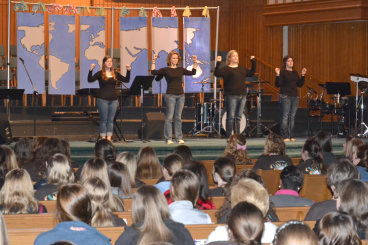On a mountaintop overlooking the adobe homes of Huancané, Peru, Juan Mamani poured beer at the base of a six-foot cross bearing the image of Jesus’ crucified body.
The act wasn’t an offering to Christ but to the wooden cross itself, a prelude to an all-night, booze-fueled party known as the Cruz de Mayo (Cross of May). It was also a physical manifestation of the spiritual depravity that separates Peru’s Aymara people from God.
Today Mamani climbs that same mountain for an entirely different reason. Each week, the 60-year-old Aymaran grandfather makes the hour-and-a-half hike over its summit to Huancané where he meets with Rick and Kelly Martinez.
Rick, who hails from Miami, Fla., and Kelly, a native of Millington, Tenn., are Southern Baptist representatives working to spread the gospel among the Aymara. Two years ago, the Lord used their witness to lead Mamani to faith. Now Rick is discipling him to take the good news to his own people.
With Mamani’s help, the Martinezes have launched three new Baptist church plants in the past three years. It’s a good start, but only a beginning for the gospel here.
Roughly 80,000 Aymara live in the two provinces surrounding the city of Huancané, divided among some 700 villages, with fewer than 40 evangelical churches between them. But unlike many of the world’s 6,000-plus unreached people groups, the Aymara have had plenty of opportunities to hear God’s Word.
“Everybody here has heard about Jesus — everybody,” Rick said, explaining that Catholic missionaries first brought the gospel to Peru more than 400 years ago. But instead of fully embracing Christianity, the Aymara simply blended it with their animistic heritage. The result was a syncretistic folk-Catholicism that revered both God and natural “spirits” — not saving faith in Jesus Christ.
In order to lead the Aymara to genuine faith, Rick and Kelly believe they must separate the worship of creation from the Creator by presenting an undiluted gospel message.
Simple Bible studies coupled with the “JESUS” film are their primary tools for evangelism. The idea is to start Bible studies in dozens of Aymara villages.
As the groups mature, they simultaneously lay the groundwork for new churches.
“You have to chip away at their worldview and replace it with truth,” Rick said. “It’s a slow process.”
It isn’t easy, either. Though the Martinezes have seen some success, the Aymara’s resistance to the gospel usually has more to do with lifestyle than theology.
“There is no entertainment here, no outlet,” Rick said. “The one time that the Aymara people have to let loose is during these religious festivals, which are basically big drunken parties.”
“I believe my job as a missionary isn’t to tell these people how to live,” Rick added. “My job is to teach them the truth and allow them to come to the conviction that the things they’re doing aren’t right.”
Juan Mamani is among the handful of Aymara who have come to that conclusion.
He’s traded drinking for discipleship and now pastors one of the Martinezes’ church plants. Rick’s vision is to see more Aymara going out with a heart for their own people. “Once that starts to happen,” Rick said, “I don’t think it will ever stop.” (IMB)




Share with others: